Khmer Rouge leaders facing trial
- Published
A UN-backed genocide tribunal in Cambodia is set to begin its second trial, this time of the top-most leaders of the Khmer Rouge regime.
Up to two million people were killed or starved to death under Khmer Rouge rule in the 1970s.
Three main leaders - Nuon Chea, Khieu Samphan and Ieng Sary - will be in court. Another, Ieng Thirith, has been found incapable of standing trial because of ill health.
Former Khmer Rouge prison chief Kaing Guek Eav, better known as Comrade Duch, was convicted last year in the tribunal's first case.
Nuon Chea
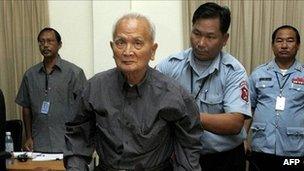
Nuon Chea is viewed as the chief ideologue of the movement
Nuon Chea, who is viewed as the chief ideologue of the movement, has been charged with war crimes and crimes against humanity.
He is commonly known as Brother Number Two as he was second in command to the founder and leader of the Khmer Rouge, Pol Pot.
Nuon Chea defected from the Khmer Rouge in 1998 and was granted a pardon by Cambodian Prime Minister Hun Sen.
In December 2002 he was called to testify on behalf of the former Khmer Rouge general Sam Bith, who was sentenced to life in prison for ordering the kidnap and murder of three Western backpackers in 1994.
So far he has denied being involved in the atrocities that went on during the Khmer Rouge regime, but critics suggest that at the very least he was fully informed of what was happening.
Khieu Samphan
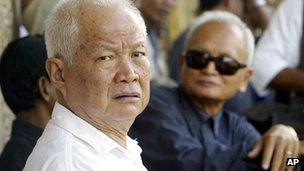
Khieu Samphan says he was not directly responsible for any deaths
Khieu Samphan was the Khmer Rouge's official head of state.
He was the public face of the Khmer Rouge, and defected at the same time as Nuon Chea.
In its detention order, the prosecution alleged that Khieu Samphan "aided and abetted" the policies of the Khmer Rouge, which were "characterised by murder, extermination, imprisonment, persecution on political grounds and other inhumane acts".
Khieu Samphan insists that, as head of state, he was never directly responsible for the deaths which happened under the regime.
Until his arrest, he was said to spend most of his time at his home in Pailin, once the movement's jungle headquarters, reading, listening to music or gardening.
Ieng Sary
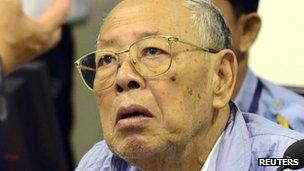
Ieng Sary is blamed for luring many Cambodians back to the country to their deaths
Ieng Sary, also known as Brother Number Three, served as the country's foreign minister and was often the only point of contact between Cambodia's rulers and the outside world.
He is said to have been responsible for convincing many educated Cambodians who had fled the Khmer Rouge to return to help rebuild the country.
Many were then tortured and executed as part of the purge of intellectuals.
Ieng Sary became the first senior leader to defect in 1996 - and as a result was granted a royal pardon.
The United Nations says such a pardon cannot protect someone from prosecution, but Cambodian Prime Minister Hun Sen has previously warned that going after Ieng Sary could re-ignite civil unrest in Cambodia.
Ieng Thirith
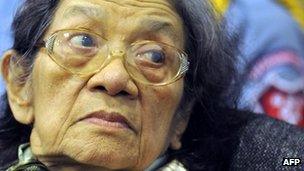
Ieng Thirith was one of the Khmer Rouge's founding members
Ieng Thirith was one of the Khmer Rouge's founding members and its most powerful woman.
Her sister was married to the movement's leader, Pol Pot, and she was married to Ieng Sary.
She served as the regime's social affairs minister. Prosecutors say she knew that tens of thousands of people were dying from starvation and disease on brutal collective farms - but did nothing to stop the disaster.
She denies any wrongdoing and is now ill. Judges say she is not mentally fit to stand trial, and have recommended that the case against her be suspended.
Previous case: Comrade Duch
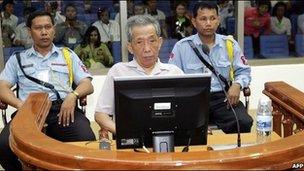
Comrade Duch (Kaing Guek Eav) is now in prison following his conviction last year
Comrade Duch (Kaing Guek Eav) was convicted of war crimes and crimes against humanity in July 2010.
A former maths teacher, he oversaw the Tuol Sleng interrogation centre in the Cambodian capital, Phnom Penh.
There as many as 15,000 men, women and children are thought to have been imprisoned, tortured and killed.
He says he acted under orders and would have been killed if he had failed to obey them.
Others who escaped justice
The man most wanted for crimes against humanity in Cambodia will never be brought to justice.
Pol Pot, the founder and leader of the Khmer Rouge, died in a camp along the border with Thailand in 1998.
Other key figures have also died, including Ta Mok, the regime's military commander and one of Pol Pot's most most-feared associates.
Survivors of the Khmer Rouge regime hope that the process of bringing the remaining leaders to justice will move on swiftly, before they become too old or ill to appear in the dock.